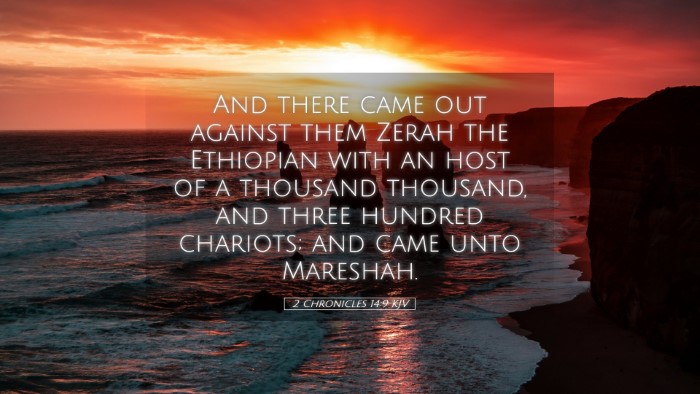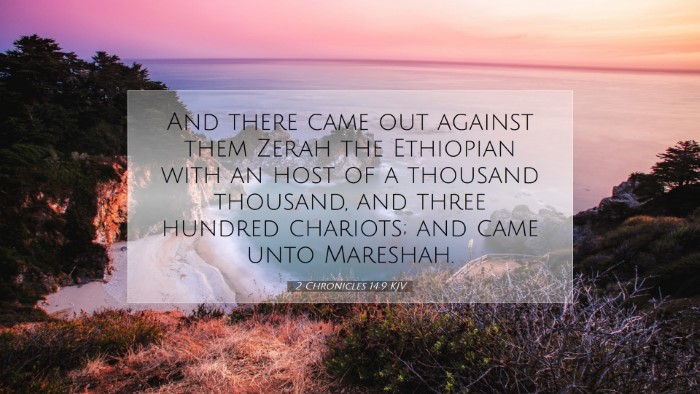Commentary on 2 Chronicles 14:9
Verse: "And there came out against them Zerah the Ethiopian with an host of a thousand thousand, and three hundred chariots; and came to Mareshah."
Introduction
This verse from 2 Chronicles introduces a significant military conflict during the reign of King Asa of Judah. It highlights the encounter with Zerah the Ethiopian, whose formidable army posed a grave threat to Judah. Commentaries by Matthew Henry, Albert Barnes, and Adam Clarke provide profound insights into the historical and theological implications of this event.
1. Historical Context
The historical backdrop of this conflict is crucial for understanding its significance. Asa was a king dedicated to reforms in Judah, turning the nation back to the worship of Yahweh. In his reign, Asa faced numerous challenges, including military threats from powerful enemies.
- Military Context: The reference to Zerah the Ethiopian,, likely representing a coalition of African nations, indicates the geopolitical challenges of the time. Such coalitions were common in the ancient world, often involving alliances across vast regions.
- Numerical Superiority: Zerah's army, described as "a thousand thousand" (1,000,000), portrays a severe numerical disadvantage for Asa. The three hundred chariots further emphasize the technological and tactical superiority of Zerah's forces.
2. Theological Implications
This passage carries substantial theological implications about faith and reliance on God. Asa's response to this challenge can serve as a model for believers.
- Faith in Adversity: Asa’s immediate response to Zerah’s invasion was to seek God in prayer. This action underscores a central theme in Scripture: turning to God in times of distress. Matthew Henry emphasizes the importance of prayer during trials, suggesting it is not simply a last resort but a primary means of accessing divine strength.
- God's Sovereignty: The conflict also illustrates God’s sovereignty over nations and events. Despite the overwhelming odds against Judah, God’s power is demonstrated through Asa’s eventual victory, highlighting that human strength is feeble compared to divine intervention.
3. Asa's Leadership
As King Asa, his leadership style reflects significant traits worth noting for pastors and leaders today:
- Initial Reforms: Prior to this conflict, Asa enacted reforms to remove idols and restore proper worship, showing the importance of preparing oneself spiritually for future challenges.
- Calling for Unity: Asa’s leadership called the people of Judah together; his example encourages leaders to rally their communities in times of distress.
4. The Nature of Faith and Victory
Asa's encounter with Zerah serves as a poignant reminder about the nature of faith and the reality of victory in the face of overwhelming odds:
- Believing Against All Odds: Faith requires one to believe in God’s promises despite the presence of daunting challenges. Albert Barnes suggests that Asa’s faith lay in his reliance on God rather than his military strength.
- The Ultimate Victory: The resolution of this conflict, where God delivered Judah, reinforces that true victory comes from divine assistance. Adam Clarke notes that it is God's power, not human ability, that determines the outcome of battles.
5. Lessons for Today
This passage offers timeless lessons that extend beyond its historical context:
- Trusting God: The need for a deep-seated trust in God is paramount. Believers are reminded to rely on God’s resources over their own.
- Importance of Prayer: Asa’s prayer at such a critical juncture serves as a reminder of the power of seeking God constantly, especially in dire situations.
- Preparation in Peacetime: Asa’s earlier reforms signify the importance of spiritual preparedness in times of peace to withstand future trials.
Conclusion
In summary, 2 Chronicles 14:9 is not merely a historical account but a rich source of theological reflection and practical understanding. Through the lens of Asa's experience, readers are invited to consider their own responses to adversity, the necessity of prayer, and the unequivocal belief in God’s sovereignty. The insights provided by Matthew Henry, Albert Barnes, and Adam Clarke serve to enrich our understanding and application of this text, making it valuable for pastors, students, and theologians alike.


